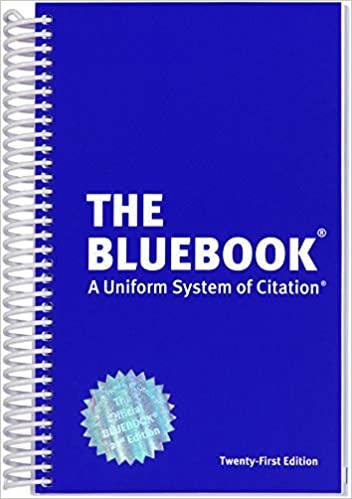Question
QUESTION 11 Immanuel Kant believed that the results of a decision are not as important as the reason for making it. This is the principle
QUESTION 11
Immanuel Kant believed that the results of a decision are not as important as the reason for making it. This is the principle behind
| a. | utilitarian ethics. | |
| b. | deontological ethics. | |
| c. | Rawlsian justice. | |
| d. | moral relativism. |
4 points
QUESTION 12
What two conditions must exist for federal courts to have diversity jurisdiction?
| a. | An individual is bringing suit against a corporation, and the amount in dispute exceeds $75,000. | |
| b. | The plaintiff and defendant are from the same family, and the amount in dispute exceeds $50,000. | |
| c. | The case has been tried in two different states with two different outcomes, and the amount in dispute exceeds $50,000. | |
| d. | The plaintiff and defendant are citizens of different states, and the amount in dispute exceeds $75,000. |
4 points
QUESTION 13
Jordan and Terry are business partners who are engaged in a dispute. They meet with a neutral third party to try to resolve the dispute with a binding award. Jordan and Terry are engaged in
| a. | arbitration. | |
| b. | mediation. | |
| c. | negotiation. | |
| d. | litigation. |
4 points
QUESTION 14
Judges have the authority to issue court orders that
| a. | require people or companies to appeal their court orders. | |
| b. | place discretionary obligations on specific people or companies. | |
| c. | require Congress or state legislatures to ratify their court orders. | |
| d. | place binding obligations on specific people or companies. |
4 points
QUESTION 15
In the House of Representatives, a state's voting power is based on its
| a. | relative wealth. | |
| b. | date of entry into the Union. | |
| c. | physical size. | |
| d. | population. |
4 points
QUESTION 16
The goal of utilitarian ethics is to
| a. | establish rules for why certain behaviors are ethical. | |
| b. | do the right thing, no matter the result. | |
| c. | produce the greatest good for the greatest number of people. | |
| d. | establish universal ethical rules that apply to all people. |
4 points
QUESTION 17
Congress is concerned that too much pollution is being emitted into the air over major cities. To reduce this air pollution, Congress passes the Clean Air Act. After disagreements over the definition of "pollution," the Environmental Protection Agency (EPA) defines it as anything emitted into the air. This definition is
| a. | a legislative rule that companies must follow. | |
| b. | an interpretive rule that does not change the law. | |
| c. | adjudication by the agency. | |
| d. | not valid until ratified by Congress. |
4 points
QUESTION 18
The United States Constitution is
| a. | the supreme law of the land. | |
| b. | a discretionary guideline for the federal government to follow. | |
| c. | a guideline for states to follow in developing their own state constitutions. | |
| d. | stare decisis. |
4 points
QUESTION 19
Linda and Tom are involved in a contract dispute. Linda sues Tom, and he receives her complaint. Linda
| a. | must prove her case beyond a reasonable doubt. | |
| b. | must prove her case by a preponderance of the evidence. | |
| c. | need not prove her case because Tom has the burden of proof. | |
| d. | need not prove her case because the state has the burden of proof. |
4 points
QUESTION 20
Judicial review can best be described as the power of a federal court to
| a. | abstain from adjudicating major issues and to leave such matters to legislatures. | |
| b. | take it upon itself to decide issues on constitutional grounds. | |
| c. | declare a statute or governmental action unconstitutional and void. | |
| d. | take private property for public use. |
Step by Step Solution
There are 3 Steps involved in it
Step: 1

Get Instant Access to Expert-Tailored Solutions
See step-by-step solutions with expert insights and AI powered tools for academic success
Step: 2

Step: 3

Ace Your Homework with AI
Get the answers you need in no time with our AI-driven, step-by-step assistance
Get Started


